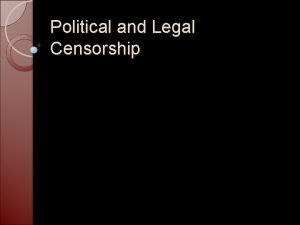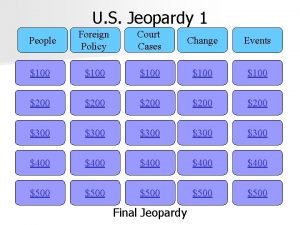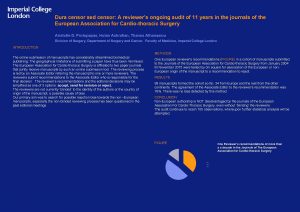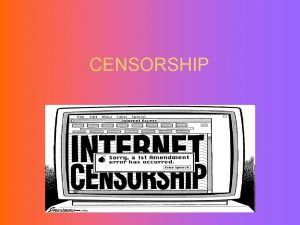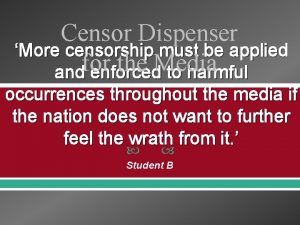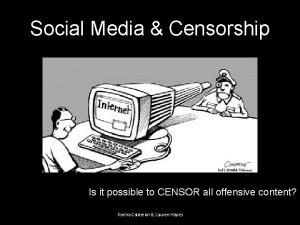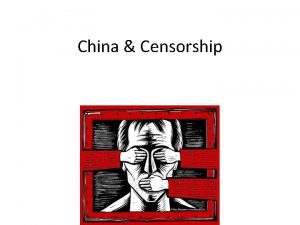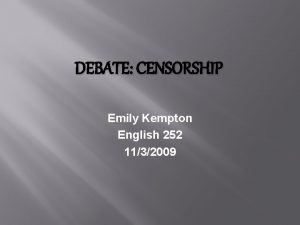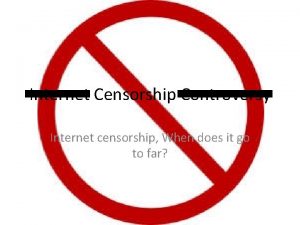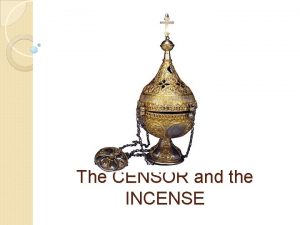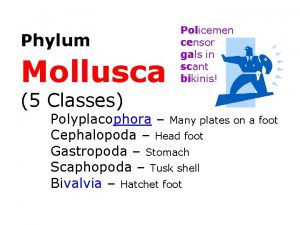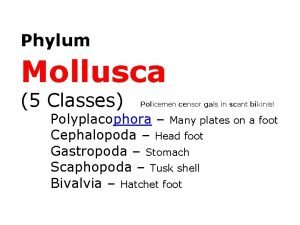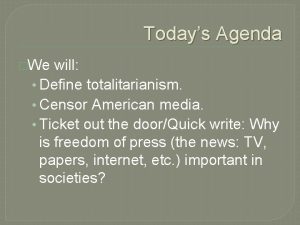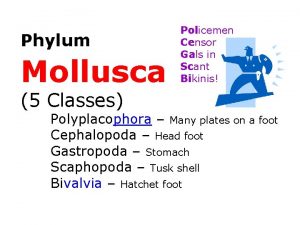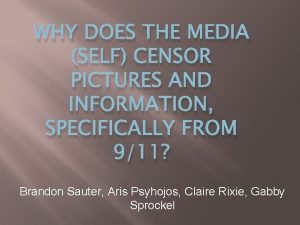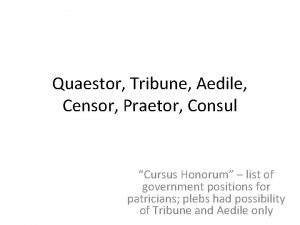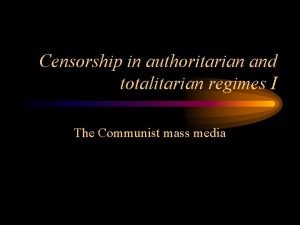WHAT IS A CENSOR or CENSORSHIP CENSORSHIP The






















![IDIOMS – Lines 21 -31 “down in the dumps” [sad] “cashes in” [takes advantage IDIOMS – Lines 21 -31 “down in the dumps” [sad] “cashes in” [takes advantage](https://slidetodoc.com/presentation_image_h2/a369197bf21068907c4f7c4328acd785/image-23.jpg)












![ANALYZE POINT OF VIEW – Cultural Background [lines 80– 86] Authors often describe aspects ANALYZE POINT OF VIEW – Cultural Background [lines 80– 86] Authors often describe aspects](https://slidetodoc.com/presentation_image_h2/a369197bf21068907c4f7c4328acd785/image-36.jpg)





- Slides: 41


WHAT IS A CENSOR or CENSORSHIP ?

CENSORSHIP The suppression or prohibition of any parts of books, films, news, speech, etc. that are considered obscene, politically unacceptable, or a threat to security. “Argentina’s regulations imposed censorship on all media“

THINK-IN-INK AND SHARE Think-In-Ink-Share (TIIS) is a collaborative learning strategy in which students work together to answer questions about an assigned reading. This technique requires students to (1) Think individually about a reading. (2) Write down thoughts or generate questions on paper (3) Share ideas with classmates. Discussing an answer with a partner or in a classroom discussion serves to maximize participation, focus attention and engage students in comprehending the reading material.

THINK-IN-INK AND SHARE Think-In-Ink-Share (TIIS) has numerous benefits: § TIIS strategy is a versatile and simple technique for improving students' reading comprehension. § TIIS gives students time to write down their ideas or reflections and activates prior knowledge. § TIIS enhances students' oral communication skills as they discuss their ideas with one another. § TIIS strategy helps students become active participants in learning and includes writing as a way of organizing thoughts generated from discussions.

TEACHER MODELED THINK-IN-INK AND SHARE Background (page 89) • • Where is Argentina? Published her first story at the age of seventeen – what year is that? 1955 I assume she took writing at the University of Buenos Aires? She moved to Paris and traveled abroad for several years – how many years? Approximately 14 years She returned home in 1974 – how old was she? 36 years old To find political turmoil and oppression – what is oppression? prolonged cruel or unjust treatment or control a fascist dictatorship – what is that? a form of radical authoritarian nationalism characterized by dictatorial power System of government in which a leader suppresses opposition through violent means, now ruled Argentina – what is suppression?

SUPPRESSION the action of forcibly putting an end to something such as an activity or publication. SENTENCE: The school administration used powerful tactics in the suppression of campus protests and freedom of speech.

Argentina: The Dirty War was a campaign by the government of Argentina to suppress left-wing political opponents. It is estimated that during the period from 1976 to 1983, 10, 000 to 30, 000 citizens were killed or taken by the government and never heard from again.

BRAIN TEASER FOR THE DAY In any given year, there are 12 months. Seven months have 31 days. How many months have 28 days?

the phrase “let down your guard” in line 4 is an example of an idiom. IDIOM - A familiar expression that signifies something other than the literal meaning of its words. Context can often suggest an idiom’s meaning if it is unclear SENTENCE: A common idiom that refers to people that are very ill is to say they are as sick as a dog. Other examples are: • “Rub someone the wrong way” - meaning to annoy or bother • “Jump the gun” - would mean to be doing something early

IDIOM Speculate on the meaning of the phrase “let down your guard” in line 4 based on what we have read?

IDIOM Speculate on the meaning of the phrase “let down your guard” in line 4 based on what we have read? “let down your guard” means to relax and stop looking out for danger

IDIOM - “let down your guard” How does this idiom contribute to the opening of the story?

IDIOM - “let down your guard” How does this idiom contribute to the opening of the story? It creates tension

IDIOM - “let down your guard” What does this suggest about what might happen in the story?

IDIOM - “let down your guard” What does this suggest about what might happen in the story? The character might be hurt or may get in trouble

ANALYZE AUTHOR’S CHOICES Authors sometimes choose not to provide certain details about characters and events. Why does the author choose not to reveal the contents of Juan’s letter to Mariana (lines 9 -11)?

ANALYZE AUTHOR’S CHOICES Why does the author choose not to reveal the contents of Juan’s letter to Mariana (lines 9 -11)? We can tell that the relationship is intimate and private. The fact that Juan wrote the letter is important. Virtually anything in the letter content could be considered suspicious so it isn’t necessary for the author to provide specific details.

POINTS OF VIEW Point of view is an integral tool of description in the author’s hands to portray personal emotions or characters’ feelings about an experience or situation. Writers use a point of view to express effectively what they want to convey to their readers. • First person: using "I" or "we“ First person limits the reader to one character's perspective, but can be powerful. • Second person: "you" Second person is writing from the point of view of a narrative onlooker who is writing about you; the least common point of view. • Third person: "he, " "she, " "it, “ “they, ” or a name Third person is actually a more versatile point of view. Third person allows the writer to create a richer, more complicated universe.

ANALYZE POINT OF VIEW – Cultural Background An author’s cultural experience and viewpoint are often revealed through the thoughts and actions of a character. What do the details in lines 13– 18 reveal about the fear and oppression experienced by the people of Argentina?

ANALYZE POINT OF VIEW – Cultural Background What do the details in lines 13– 18 reveal about the fear and oppression experienced by the people of Argentina? The author communicates the repression and harshness of the regime by writing about them through the thoughts of Juan. This shows that the people of Argentina were not free to express themselves; any communication was suspicious. The author’s use of the impersonal word “they” conveys the threat of danger.

IDENTIFY IDIOMS Identify the idioms in lines 21– 31 and attempt to state their meanings within the context of the text.
![IDIOMS Lines 21 31 down in the dumps sad cashes in takes advantage IDIOMS – Lines 21 -31 “down in the dumps” [sad] “cashes in” [takes advantage](https://slidetodoc.com/presentation_image_h2/a369197bf21068907c4f7c4328acd785/image-23.jpg)
IDIOMS – Lines 21 -31 “down in the dumps” [sad] “cashes in” [takes advantage of] “beat them to the punch” [do something first] “throw sand in its gears” [obstruct] “get to the bottom of” [solve]

ANALYZE AUTHOR’S CHOICES A character’s motivation—what he or she wants—drives the plot, or sequence of events, forward. Sometimes foreshadowing hints at the conflict the character will encounter. What statement does the author include in lines 38– 44 that might foreshadow future events?

ANALYZE AUTHOR’S CHOICES What statement does the author include in lines 38– 44 that might foreshadow future events? “Ulterior motives couldn’t be overlooked by the Censorship Division” (lines 38– 39) suggest that Juan is playing a dangerous game and his employers will watch him carefully in the future. The statement implies that those people with “ulterior motives” will be found and punished.

STAIDNESS – the quality of being steady, calm and serious. SENTENCE: The police officer showed complete and utter staidness when she calmly arrested the suspect carrying a gun. staidness: The calmness in the Censorship Division existed because of the serious work that took place inside. What other buildings might have the same quality of staidness, and what kinds of buildings might have a “festive air? ”

What other buildings might have the same quality of staidness, and what kinds of buildings might have a “festive air? ” Government offices might have the quality of staidness, while a concert hall or carnival or sports arena would seem more festive.

NEGLIGENCE - failure to take proper care in doing something; or failure to exercise the care that a normal person would exercise in like circumstances. SENTENCE: The company was charged with negligence in the manufacturing of the defective tires.

ANALYZE AUTHOR’S CHOICES An author can manipulate time in a story by changing its pace—slowing down or speeding up plot events. This can affect the mood of a story. Identify words and phrases in lines 67– 75 that indicate a change in pace. What type of change in pace is happening?

ANALYZE AUTHOR’S CHOICES “Soon” (line 68) “day after day” (line 68) “zeal” (line 75) - great energy or enthusiasm in pursuit of a cause or an objective. “swift promotion” (line 75). These words indicate a quickening in the pace of events.

ANALYZE AUTHOR’S CHOICES What mood is created in this section. (lines 67– 75) How does the pacing affect the mood?

ANALYZE AUTHOR’S CHOICES What mood is created in this section. How does the pacing affect the mood? The accelerating pace and description of Juan’s days creates a feeling of anxiety, tension, and sadness.

SUBVERSIVE - in opposition to a civil authority or government (adj. ); or a radical supporter of political or social revolution (noun). SENTENCE: You might want to call someone subversive if they are sneakily trying to undermine something, from the social structure of your high school to an entire system of government.

These were horrible days when he was shocked by the subtle and conniving ways employed by people to pass on subversive messages; his instincts were so sharp that he found behind a simple ‘the weather’s unsettled’ or ‘prices continue to soar’ the wavering hand of someone secretly scheming to overthrow the Government. (lines 70 -74) Question: Explain what the government believed might happen if these subversive messages were not intercepted.

These were horrible days when he was shocked by the subtle and conniving ways employed by people to pass on subversive messages; his instincts were so sharp that he found behind a simple ‘the weather’s unsettled’ or ‘prices continue to soar’ the wavering hand of someone secretly scheming to overthrow the Government. (lines 70 -74) Question: Explain what the government believed might happen if these subversive messages were not intercepted. Answer: They might be the first step in overthrowing the government.
![ANALYZE POINT OF VIEW Cultural Background lines 80 86 Authors often describe aspects ANALYZE POINT OF VIEW – Cultural Background [lines 80– 86] Authors often describe aspects](https://slidetodoc.com/presentation_image_h2/a369197bf21068907c4f7c4328acd785/image-36.jpg)
ANALYZE POINT OF VIEW – Cultural Background [lines 80– 86] Authors often describe aspects of a character’s life over a period of time to express a point of view. How does Juan’s job change his personal life? What details (from the reading) show this transformation?

ANALYZE POINT OF VIEW – Cultural Background • How does Juan’s job change his personal life? • What details (from the reading) show this transformation? Juan no longer enjoys eating, feels exhausted, ignores his mother’s worrying, and doesn’t want to be with friends [lines 80– 86].

ANALYZE AUTHOR’S CHOICES - IRONY Verbal irony is the use of language to express the opposite sentiment than what is expected. The most recognizable form of verbal irony is sarcasm, where the speaker says the opposite of what they mean, often for comedic effect. * find an example of verbal irony on page 92 and explain why it is ironic.

ANALYZE AUTHOR’S CHOICES - IRONY ANSWER - “He had a truly patriotic task” [lines 88– 89]. Juan’s task is in fact the opposite of patriotic. He may think it is patriotic— demonstrating that he loves his country—but in fact his work causes harm to his fellow citizens. * find an example of verbal irony on page 92 and explain why it is ironic.

ANALYZE AUTHOR’S CHOICES - IRONY * find an example of situational irony on page 92 and explain why it is ironic. Situational irony is when the exact opposite of what you expect to happens. Situational irony, like verbal irony, is powered by the inconsistency between the expectation and the actual outcome.

ANALYZE AUTHOR’S CHOICES - IRONY ANSWER - “Naturally, he censored it without regret. And just as naturally, he couldn’t stop them from executing him the following morning, another victim of his devotion to his work. ” [lines 93 -96]. A man survives a plane crash only to be killed on the way to the hospital in an ambulance wreck. * find an example of situational irony on page 92 and explain why it is ironic. Juan censors his own letter. This is ironic because his original intention for becoming a censor was to avoid having his own letter censored; he thereby incriminates himself and is executed by the government.
 Hook bridge thesis examples
Hook bridge thesis examples Political censorship examples
Political censorship examples Censorship
Censorship Trời xanh đây là của chúng ta thể thơ
Trời xanh đây là của chúng ta thể thơ Phản ứng thế ankan
Phản ứng thế ankan Voi kéo gỗ như thế nào
Voi kéo gỗ như thế nào Thiếu nhi thế giới liên hoan
Thiếu nhi thế giới liên hoan Fecboak
Fecboak điện thế nghỉ
điện thế nghỉ Một số thể thơ truyền thống
Một số thể thơ truyền thống Thế nào là hệ số cao nhất
Thế nào là hệ số cao nhất Hệ hô hấp
Hệ hô hấp Lp html
Lp html Các số nguyên tố là gì
Các số nguyên tố là gì đặc điểm cơ thể của người tối cổ
đặc điểm cơ thể của người tối cổ Các châu lục và đại dương trên thế giới
Các châu lục và đại dương trên thế giới Chụp tư thế worms-breton
Chụp tư thế worms-breton ưu thế lai là gì
ưu thế lai là gì Thẻ vin
Thẻ vin Tư thế ngồi viết
Tư thế ngồi viết Cái miệng nó xinh thế
Cái miệng nó xinh thế Các châu lục và đại dương trên thế giới
Các châu lục và đại dương trên thế giới Cách giải mật thư tọa độ
Cách giải mật thư tọa độ Bổ thể
Bổ thể Từ ngữ thể hiện lòng nhân hậu
Từ ngữ thể hiện lòng nhân hậu Tư thế ngồi viết
Tư thế ngồi viết Giọng cùng tên là
Giọng cùng tên là Thơ thất ngôn tứ tuyệt đường luật
Thơ thất ngôn tứ tuyệt đường luật Alleluia hat len nguoi oi
Alleluia hat len nguoi oi Hổ sinh sản vào mùa nào
Hổ sinh sản vào mùa nào Diễn thế sinh thái là
Diễn thế sinh thái là Vẽ hình chiếu vuông góc của vật thể sau
Vẽ hình chiếu vuông góc của vật thể sau Công thức tính thế năng
Công thức tính thế năng 101012 bằng
101012 bằng Tỉ lệ cơ thể trẻ em
Tỉ lệ cơ thể trẻ em Thế nào là mạng điện lắp đặt kiểu nổi
Thế nào là mạng điện lắp đặt kiểu nổi Lời thề hippocrates
Lời thề hippocrates Vẽ hình chiếu đứng bằng cạnh của vật thể
Vẽ hình chiếu đứng bằng cạnh của vật thể đại từ thay thế
đại từ thay thế Quá trình desamine hóa có thể tạo ra
Quá trình desamine hóa có thể tạo ra Các môn thể thao bắt đầu bằng tiếng chạy
Các môn thể thao bắt đầu bằng tiếng chạy Sự nuôi và dạy con của hươu
Sự nuôi và dạy con của hươu

